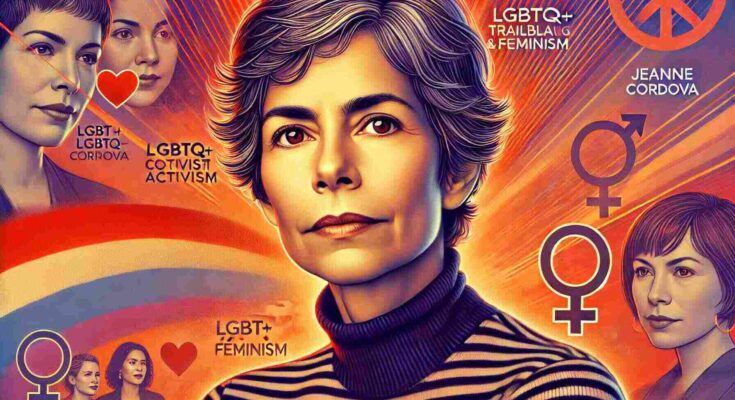Contents
- 1 Introduction to Jeanne Córdova
- 2 Early Life and Identity
- 3 The Awakening of an Activist
- 4 The Lesbian Tide: A Platform for Change
- 5 Championing LGBTQ+ Rights
- 6 Breaking Barriers to Feminism
- 7 A Voice for Intersectionality
- 8 Challenges and Resilience
- 9 Personal and Professional Sacrifices
- 10 Legacy and Impact
- 11 Continuing the Fight
- 12 Recognitions and Honors
- 13 Conclusion
- 14 FAQs
Introduction to Jeanne Córdova
Jeanne Córdova was a remarkable activist, author, and key figure in the LGBTQ+ and feminist movements of the late 20th century. Her relentless advocacy for equality, freedom, and representation made her a pioneer whose impact continues to inspire generations. This article explores Jeanne Córdova’s contributions, her legacy, and the challenges she faced as a champion of social justice.
Early Life and Identity
Jeanne Córdova was born in Germany in 1948 and later moved with her family to the United States, where she grew up in a Catholic household. Córdova’s journey of understanding her identity was pivotal in shaping her activism. Coming out as a lesbian in the 1970s, during a time when societal norms were even less accepting of the LGBTQ+ community, was both a personal and political act of courage.
The Awakening of an Activist
Her journey into activism began during her college years at the University of California, Los Angeles (UCLA). Jeanne Córdova recognized the importance of creating safe and supportive spaces for the LGBTQ+ community. She actively participated in various student-led initiatives that advocated for gay and lesbian rights, laying the groundwork for her future endeavors. Her leadership at UCLA marked the beginning of her lifelong commitment to advocacy.
The Lesbian Tide: A Platform for Change
One of Jeanne Córdova’s most notable achievements was founding and publishing The Lesbian Tide, a groundbreaking feminist and lesbian newspaper in the 1970s. This publication became an essential voice for the lesbian community, addressing discrimination, political movements, and social inequalities. Under her leadership, The Lesbian Tide grew to be one of the most influential lesbian periodicals in the United States, amplifying the voices of countless women and fostering a sense of unity and resilience.
Championing LGBTQ+ Rights
Jeanne Córdova was not just a writer but an organizer and speaker who traveled the streets to demand justice. She was deeply involved in the first National Gay and Lesbian March on Washington in 1979, a pivotal event that brought attention to LGBTQ+ issues nationally. Her activism extended to fighting against discriminatory laws and advocating for rights that the community was denied, such as job security, anti-discrimination protections, and the right to marry. Córdova’s presence at protests and rallies symbolized strength and defiance, empowering others to join the movement.
Breaking Barriers to Feminism
Jeanne Córdova’s activism intersected with the feminist movement, emphasizing the importance of inclusivity within feminist spaces. She believed that true gender equality could only be achieved by recognizing the diverse experiences of all women, including lesbians and other marginalized identities. Córdova’s work helped bridge gaps between the feminist and LGBTQ+ communities, fostering a more comprehensive and inclusive approach to advocacy.
A Voice for Intersectionality
Ahead of her time, Córdova advocated for intersectionality—a term that would gain widespread recognition years after her initial activism. She understood that the struggles faced by women and LGBTQ+ individuals were interconnected with other social issues, such as race and socioeconomic status. Her approach to activism laid the foundation for future movements that recognize and address multiple forms of discrimination simultaneously. Córdova’s insistence on intersectional activism inspired others to adopt a more inclusive strategy in their fight for social justice.
Challenges and Resilience
Jeanne Córdova’s path was not without obstacles. Facing backlash from conservative groups and navigating a society that was slow to accept LGBTQ+ rights required immense fortitude. Córdova was constant in her goal despite these obstacles. Her resilience inspired others to continue fighting for equality, even in adversity. Her determination demonstrated that activism is not only about achieving immediate victories but also about fostering long-term change.
Personal and Professional Sacrifices
Córdova’s activism came with personal and professional costs. She often faced alienation from mainstream society and even segments of the feminist movement that were not inclusive of lesbian voices. Yet, her resolve never wavered. Her sacrifices underscored her deep commitment to the causes she believed in and highlighted the resilience needed to create lasting social change. She balanced the demands of her public life with personal hardships while championing marginalized communities’ rights.
Legacy and Impact
Jeanne Córdova left behind a legacy that continues to influence contemporary activism. Her memoir, When We Were Outlaws, offers a raw and personal account of her life as an activist during a turbulent era. The book provides invaluable insights into the struggles and triumphs of fighting for LGBTQ+ rights and remains a vital piece of literature for those interested in social justice. It captures her fearless spirit and dedication, inspiring those who wish to follow in her footsteps.
Continuing the Fight
The work initiated by Jeanne Córdova has paved the way for future generations of activists. Her contributions have been recognized in various documentaries, academic studies, and LGBTQ+ archives. Modern movements championing equality and human rights owe a debt to trailblazers like Córdova, whose tireless efforts laid the foundation for today’s progress. Her legacy continues to be a reminder of the power of collective action and the importance of standing firm in the face of resistance.
Recognitions and Honors
Jeanne Córdova has received numerous accolades for her work throughout her life and posthumously. Her name has been etched into the annals of LGBTQ+ history as a symbol of bravery and relentless pursuit of justice. Córdojournalism awards have been celebrated as catalysts for change, from journalism awards to acknowledgments by activist organizations.
Conclusion
Jeanne Córdova was more than just an activist; she was a visionary who dared to challenge the status quo and fight for the marginalized. Her impact on LGBTQ+ rights and feminism is profound, illustrating the power of perseverance and the importance of advocating for a more inclusive society. Córdova’s story is a testament to the belief that one person’s dedication can ignite change that resonates for generations. Her legacy serves as a beacon for those committed to justice and equality.
FAQs
Who was Jeanne Córdova?
Jeanne Córdova was an LGBTQ+ activist, author, and feminist who was prominent in advocating for lesbian rights and gender equality.
What was The Lesbian Tide?
The Lesbian Tide was a feminist and lesbian newspaper founded by Jeanne Córdova in the 1970s, which became one of the most influential publications for the lesbian community.
What were Jeanne Córdova’s significant achievements?
Córdova’s significant achievements include founding The Lesbian Tide, participating in the first National Gay and Lesbian March on Washington, and her extensive work bridging the LGBTQ+ and feminist movements.
How did Jeanne Córdova contribute to feminism?
Jeanne Córdova contributed to feminism by advocating for the inclusion of lesbian voices and promoting intersectionality within the feminist movement.
What is Jeanne Córdova’s legacy?
Jeanne Córdova’s legacy lies in her fearless activism and the significant strides she made for LGBTQ+ rights and gender equality. Her work continues to inspire modern activists and movements.
Why is Jeanne Córdova’s work still relevant today?
Jeanne Córdova’s work is still relevant today because the fight for equality, inclusion, and intersectionality continues. Her approach and dedication set the stage for ongoing social justice efforts that address multiple forms of discrimination.


